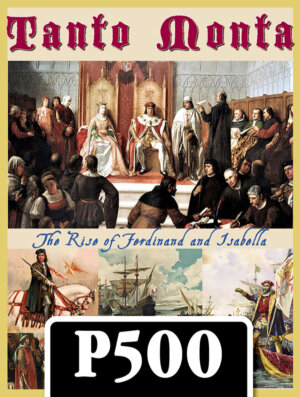
From GMT:
1469—The Iberian Peninsula has been splintered into numerous caliphates and kingdoms over the last 700 years. Warfare—part of the desperate competition between Christian and Muslim faiths often referred to as the Reconquista—has been the one constant. Now age 18, Isabella of Castile has already been offered in marriage alliances to both Portugal and France. Against the wishes of her brother, King Henry IV, she refuses both deals and instead elopes to marry her original betrothed, Ferdinand II of Aragon. Within five years, her brother is dead, and Isabella is named Queen of Castile. But can this fragile alliance between Castile and Aragon hope to prosper facing threats from all sides?
Tanto Monta: The Rise of Ferdinand and Isabella covers the period from 1470 to 1516, the height of the Age of Discovery and the years leading immediately into the period covered by Here I Stand: Wars of the Reformation, 1517-1555. The game opens with Isabella’s disputed ascension to the throne of Castile, a position contested by a Portuguese-backed faction supporting Joanna La Beltraneja. Ferdinand’s possessions are similarly threatened by Aragon’s ongoing civil war against forces from the Principality of Catalonia, a faction often supported by France. How can these young Catholic Monarchs possibly deal with both these crises while still pursuing their agendas to unite their two kingdoms into a single Spanish realm, subjugate the Canary Islands, and finish the reconquest of Granada?
Opposing the Spanish player are three more emerging powers. Portugal has been immersed in the exploration of West Africa under the guidance of Prince Henry the Navigator. Can they push further around the coasts of Africa and establish direct trade with the spice merchants of India? Meanwhile the French, initially led by Louis XI the Prudent, are trying to emerge out of the Hundred Years’ War against England and consolidate the power of the crown over the nobles of that land. Once ready to push south, the French nation will compete against Spain for lands from Navarre in the west to the city states of Italy in the east. And the Muslim forces are still roadblocks to all these ambitions. The Nasrid Kingdom of Granada will fiercely defend against further incursions against their highland strongholds. The Kingdom of Fez in North Africa opposes the Portuguese attempts to deny their monopoly over the spice trade. And additional Muslim forces from the Ottoman Empire and the Berber lands along the North African coast are sure to assist in the years to come.
And thus the stage is set for these four powers to compete on the battlefield, at the diplomatic tables, and across the oceans of the world. Can one of these powers unite their homeland and set the stage for a truly global empire?


















